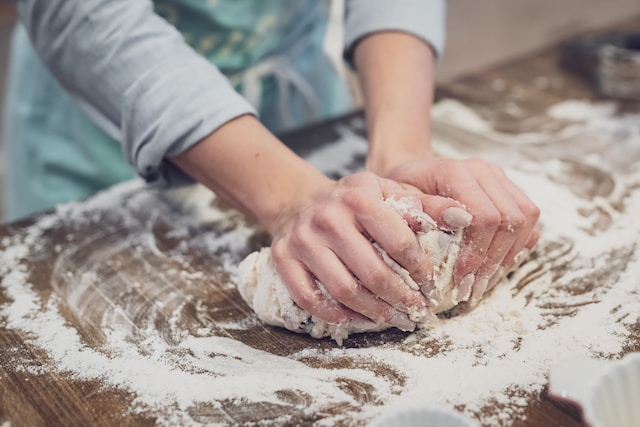Contents
5 Essential Flour Substitutes for Every Kitchen
Are you looking for alternative ingredients to use in your baking or cooking? Here are 5 essential flour substitutes that can be used in a variety of recipes:
- Almond flour
- Coconut flour
- Oat flour
- Rice flour
- Cornstarch
Introduction
Flour is a staple ingredient in many kitchens, but for those with gluten sensitivities or allergies, finding suitable substitutes can be a challenge. Fortunately, there are several alternatives to traditional flour that can be easily incorporated into your cooking and baking. In this post, we will explore five essential flour substitutes that every kitchen should have on hand.
H2 – Almond Flour
Almond flour is a popular gluten-free flour substitute made from finely ground almonds. It is rich in protein, fiber, and healthy fats, making it a nutritious option for those looking to avoid traditional wheat flour. Almond flour works well in both sweet and savory recipes and can be used to make a variety of baked goods, such as cookies, muffins, and pancakes. Learn more about almond flour here.
Oat Flour
Oat flour is another versatile gluten-free flour option that can be easily made at home by grinding rolled oats in a blender or food processor. It has a slightly sweet and nutty flavor, making it a great choice for baking. Oat flour works well in recipes for pancakes, waffles, and bread, and can also be used as a thickening agent in soups and sauces. Read more about oat flour benefits here.
Coconut Flour
Coconut flour is a unique gluten-free flour made from dried coconut meat. It is high in fiber and low in carbohydrates, making it a popular choice for those following a low-carb or ketogenic diet. Coconut flour has a light and airy texture, and it works well in recipes for cakes, cookies, and quick breads. Its subtle coconut flavor adds a tropical twist to your baked goods. Find out more about using coconut flour here.
Cassava Flour
Cassava flour, also known as yuca flour, is a gluten-free and grain-free flour made from the cassava root. It has a neutral flavor and a fine, light texture, making it a great substitute for all-purpose flour in a variety of recipes. Cassava flour can be used to make gluten-free bread, pizza crust, and pastries, and it is also commonly used as a thickening agent in soups and stews. Learn more about the benefits of cassava flour here.
Arrowroot Powder
Arrowroot powder is a starchy substance extracted from the roots of the arrowroot plant. It is often used as a thickening agent in cooking and baking, and it can be used as a one-to-one replacement for cornstarch. Arrowroot powder is flavorless and gluten-free, making it a great option for those with dietary restrictions. It can be used to thicken sauces, gravies, and puddings, and it can also be used to coat meats and vegetables before frying. Learn more about arrowroot powder and its uses here.
Conclusion
Whether you are following a gluten-free diet or simply looking to expand your culinary horizons, having a selection of flour substitutes on hand can open up a world of possibilities in the kitchen. Experiment with these essential flour substitutes to discover new flavors and textures in your favorite recipes.
Frequently Asked Questions
What are some essential flour substitutes for every kitchen?
There are several flour substitutes that can be used in recipes to accommodate dietary restrictions or preferences. Some essential substitutes include almond flour, coconut flour, oat flour, buckwheat flour, and chickpea flour.
How can almond flour be used as a substitute for regular flour?
Almond flour is a popular substitute for regular flour as it is gluten-free and provides a nutty flavor to baked goods. It can be used in a 1:1 ratio as a substitute for regular flour in most recipes.
What is coconut flour and how is it used as a flour substitute?
Coconut flour is a gluten-free flour made from dried coconut meat. It is high in fiber and low in carbohydrates, making it a healthy option for baking. When using coconut flour as a substitute, it is important to note that it is more absorbent than regular flour, so it should be used in smaller quantities and paired with added moisture in the recipe.
Can oat flour be used in place of regular flour?
Oat flour is a nutritious and versatile flour substitute that can be used in a variety of recipes. It can be made by grinding rolled oats in a food processor or blender. Oat flour is often used as a 1:1 substitute for regular flour in baking recipes and adds a slightly sweet and nutty flavor to dishes.
What are some savory dishes that can be made with chickpea flour?
Chickpea flour, also known as besan, is a versatile flour substitute that is commonly used in Indian and Middle Eastern cuisine. It can be used to make savory dishes such as chickpea flour pancakes (besan chilla), chickpea flour fritters (pakoras), and chickpea flour flatbread (socca).
Is buckwheat flour a good substitute for regular flour?
Buckwheat flour is a nutritious and gluten-free flour substitute that is rich in fiber and protein. It has a slightly nutty flavor and can be used in a 1:1 ratio as a substitute for regular flour in baking recipes. Buckwheat flour is commonly used in the making of pancakes, crepes, and bread.
The Importance of Using High-Quality Flour in Your Kitchen
When it comes to baking and cooking, the type of flour you use can greatly impact the taste and texture of your dishes. Using high-quality flour is essential for achieving the best results in the kitchen. Whether you’re making bread, cakes, or pastries, the right flour can make all the difference.
Understanding the Different Types of Flour
There are several types of flour available, each with its own unique properties. All-purpose flour, bread flour, cake flour, and whole wheat flour are just a few examples. Understanding the differences between these types of flour and knowing when to use each one is crucial for successful baking and cooking.
For more information on the various types of flour, visit Wikipedia’s page on flour.
Tips for Storing Flour
Properly storing flour is also important for maintaining its quality. Keeping flour in a cool, dry place and using an airtight container can help prevent it from spoiling or becoming infested with pests. Additionally, using flour within its expiration date is essential for optimal results.
For more kitchen tips and tricks, check out Special Magic Kitchen.
5 Essential Flour Substitutes for Every Kitchen
- Almond flour
- Coconut flour
- Oat flour
- Rice flour
- Cornstarch








































